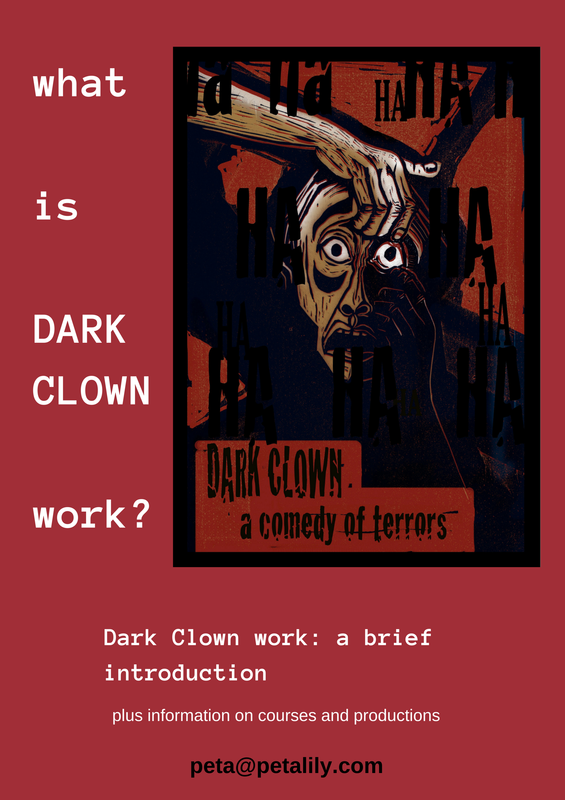In The New Review The Observer 03.04.16 Q&A
I wish satire could bite hard enough to affect those high up in power, give them a new perspective, to awaken their hearts towards justice, to point them away from inflicting suffering on others or denying or dismissing the suffering of others.
Satire can be elegant. A bold concept, clever keen language, well-articulated reversals. A single satirical cartoon can awaken awareness of an issue. Or even be a channel for emotions. I am thinking of a number of cartoons involving a weeping or violated Statue of Liberty some few years back.
From time to time people ask about the difference between Bouffon and Dark Clown. I was electrified when I first saw Philippe Gaulier leading a class on Bouffon. He walked amongst the course participants, their bodies made strange with hoods and stuffed clothing belted into place and huddled in to a choric clump. Philippe stood there tickling the tops of their heads to help them relax their surface tension and find the requisite sweetness which would allow them to thrust metaphorical daggers into the 'beautiful people' watching them.
I realise in retrospect my character, Muriel from 1984 show 'Hiroshima Mon Amour'* had aspects of the Bouffon about her, but she was mainly too kind-hearted to skewer her audience. The statements she made at the end of the piece were a kind of tough love - she had an ardent message to impart, a wake-up call rather than a shaming.
This site nicely articulates Bouffon, quoting Lecoq: “The difference between the clown and the bouffon is that while the clown is alone, the bouffon is part of a gang; while we make fun of the clown, the bouffon makes fun of us. At the heart of the bouffon is mockery pushed to the point of parody. Bouffons amuse themselves by reproducing the life of man in their own way, through games and pranks. The parody isn’t directly offensive with regard to the public; there is no deliberate intention to mock—the relation is of a different order. Bouffons come from elsewhere.”
Jacques Lecoq – “Theatre of Movement and Gesture” 2006 (Trans. David Bradbury)
The site's writer then goes on to say that what Gaulier taught was a 'stripped back, purified version of Lecoq’s Bouffon style'. From the class notes of Aqueous Humour's Artistic Director Tom Hogan: “making the beautiful people laugh is the weapon and its aim is to kill by asphyxiation in the laughter or by turning the joke so that they realise that they are laughing at themselves and in the horror of their reflected image they have a heart attack and die”.
Tom Hogan goes on to say: “We came to the understanding that the Bouffon represents the outcast, the one who fails to uphold the social etiquette expected from an integrated and fully functional member of society. They speak for the excluded, the shunned, and untouchable: those that we ignore because of our embarrassment and guilt. We realise that our position in society is upheld by those we consider to be lesser or greater than ourselves. Bouffons challenge our position in society through parody and satire, holding up a mirror to moralising, judgmental, social airs and graces.”
Though admiring Bouffon, I felt my attention called to not just the outcast but the oppressed. I was inspired (as frequent visitors to this blog will know), in 1980, by a scene in Pip Simmonds' unforgettable and disturbing production 'An die Musik'. Later a scene in Lumiere and Son's Circus Lumiere added extra resonance to the feeling of 'implication'. The work I do under the title of Dark Clown has other, non-clown inspirations including George Orwell's 1984 and Sydney Pollack's 1969 film 'They Shoot Horses Don't They?' - works which portray humanity in extremis.
The Dark Clown work I teach resonates with a life-long personal questions: Come torture or duress, what choices would I make? When given appalling choices, how does one feel as one continues to exist after whatever ghastly choice was made? When oppression is so great that courage is punished by death (or worse) - what are the options? When exactly does one succumb to force? What does the word 'force' really mean?
The work I do under the title of Dark Clown provides a way to witness humanity in extremity. For the Dark Clown, playing satire is an impossible luxury.
Although compelled in many ways by Bouffon work; as a theatre maker in the 1980's, touring small scale venues, I could not, personally, see my way to being too scathing towards the people in the audience who had actually made their way out to a small Arts Centre to watch an evening of niche, fringe, physical theatre.
Dark Clown (especially in the Enforced Performance scenarios) provides opportunities to witness. The Dark Clown as a prisoner in an Enforced Performance scenario allows an audience to see the cost of making an impossible choice under duress and the self-reflective horror and shame and indignity of carrying on existence after such a moment.
Historically, the Bouffon had a day of the year to enter the church and mock those who had privilege. The Dark Clown does not have the luxury to mock. The Dark Clown is concerned with how to survive the next 30 seconds.
Over time, scenarios not dependent on an Enforced Performance predicament have emerged. The Seal or Eco-horror scenario must be played with a sweetness of approach, similar to the Bouffon but the player cannot follow it up with a spit or the puncture of an insult. The Seal dies slowly, and apologetically in front of the audience. Dramaturgically, taken as a whole - performance and presented predicament - the piece serves as critique, similar to the function of satire, but in the playing of it, satire or mockery must not be employed.
I am interested in giving the performer the experience of embodying Marginalised Emotions and allowing the audience to witness them.
I celebrate those doing Bouffon work. Audiences get a tremendous amount from the form. And I salute satire. This post is dedicated to making a distinction between the forms.
One Clown & Dark Clown Course Participant wrote this, which captures the distinction nicely:
‘Regarding Bouffon - I saw a few similarities with the Dark Clown in the seeing humour through pain ... from what I understand, the Bouffon was created as a survival method almost, where people with disabilities and deformities would have normally been persecuted, so to escape that persecution they created characters to make their persecutors laugh, and made them laugh by cleverly parodying their persecutors. The Dark Clown is more desperate and seems to come from a more life & death situation. The main difference I see is that where the Bouffon parodies, the Dark Clown implicates.'
This person went on to say: 'The Bouffon makes you laugh without realising you may be laughing at yourself. Whereas the Dark Clown makes you laugh knowing that you really shouldn't.'
I would like to finesse that final statement - done correctly, in Dark Clown work, the audience laughs but can still see the horror of the predicament. They get to witnessing themselves laughing in the presence of a dire predicament. The Troubled Laughter the work aims at is not the snigger of transgression, it is a sound-making while witnessing. A sound which is surprised out of the audience by adept rhythm-work and comedy craft (and sound dramaturgy). When laughter happens, the Dark Clown performer swivels their face to clock the laugh, and responds (from within the reality of the portrayed situation) with an added level of shock / fear / alarm / horror / disbelief - done correctly, this allows the audience to experience a feeling of being Implicated (due to the phenomenon of 'suspension of disbelief' they feel at cause, they feel an agency in the suffering of the Dark Clown.
Going back to Elnathan John's quote at the start on this post ... regrettably, It seems that we have many in power at the moment who are immune to feeling shame.
However, there are many of us who daily witness or contemplate suffering, and find it troubling, but who often find ourselves with no time or dedicated outlet to do anything with it except put it to one side as we get on with our day.** Today, at the end of a Level 2 Dark Clown Course, a practitioner who works in the field of Social Services mentioned their gratitude for the work. In the course of their work, the trauma of a badly treated child is kept 'at arms length' and for professionals in the field, the risk is that 'empathy is blunted'. Having opportunity to embody the Marginalised Emotions, provides a kind of grounding, they said, an experience less fatiguing than keeping the emotions at bay.
Most of us want to keep the feeling of shame at arms length, it's a natural impulse. One of the character-forming and ego-reducing effects of clown training is to jettison resistance to the emotions surrounding failure. The day I realised: 'Ok, being in the 'bide'*** is somewhere I have been before', it left me free to carry on. It gave me courage without bravado, dignity in being ok with having no dignity.
I doubt many world leaders would ever enrol on a clown course - but in the meantime for those of us living with the inequities they create and sustain, perhaps Dark Clown might provide us with a bespoke moment to honour the uncomfortable emotions.
* No relation to Alain Resnais' film - screenplay by Marguerite Duras.
** Of course there is tireless petition-signing and donating and of course many courageously devote themselves to activism.
*** Gaulier's word for failure, flop.
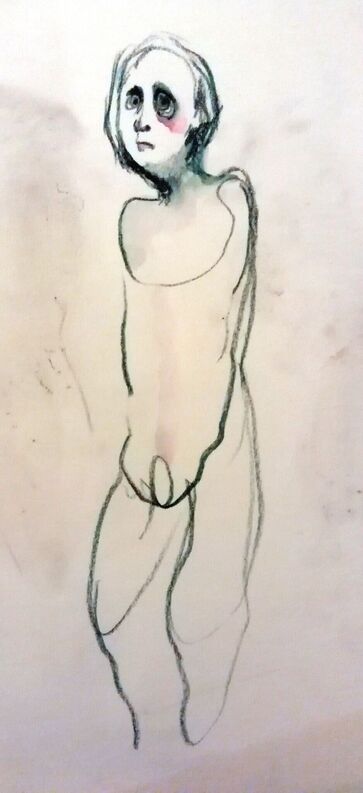
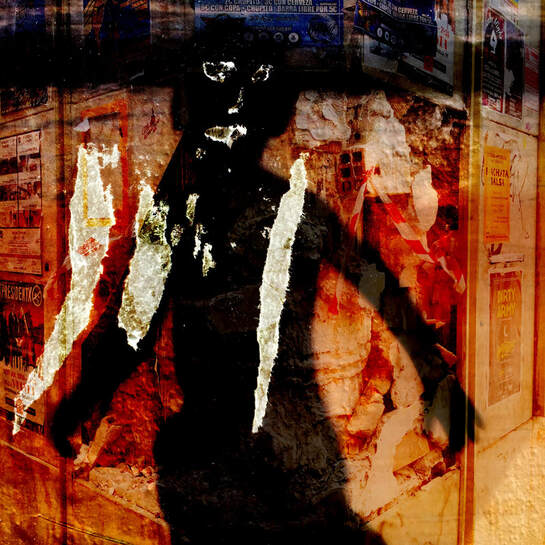
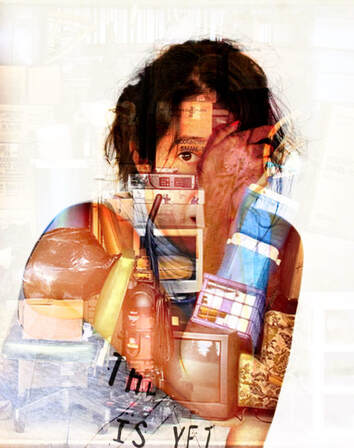
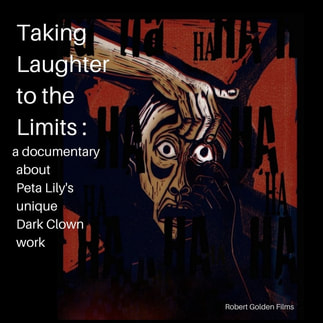
 RSS Feed
RSS Feed
